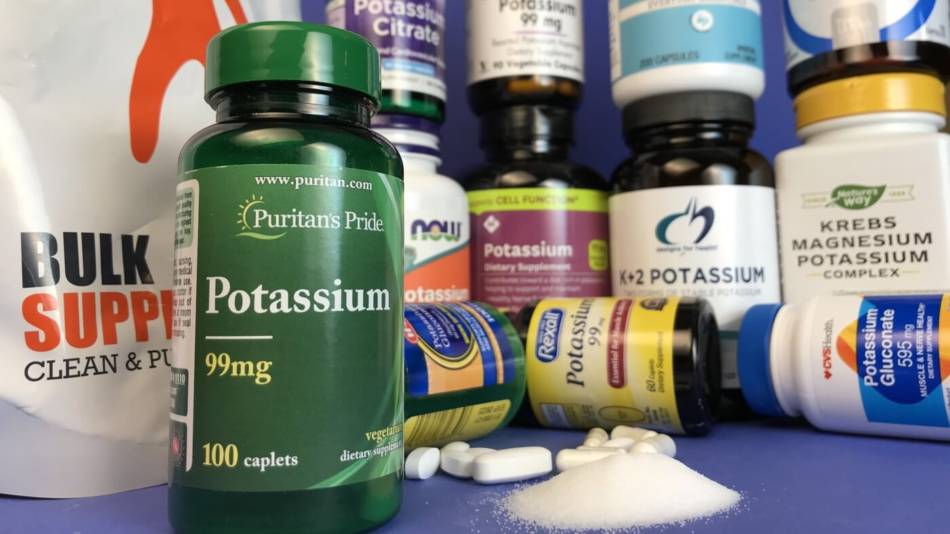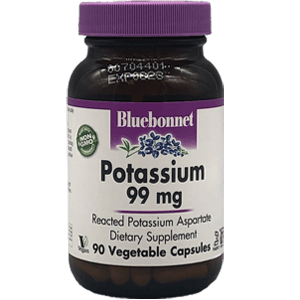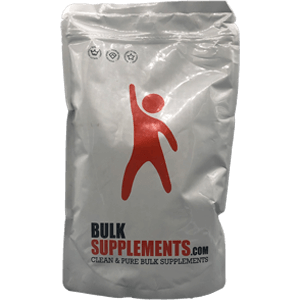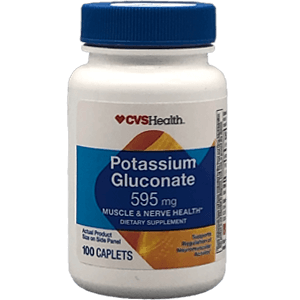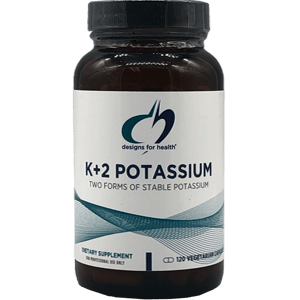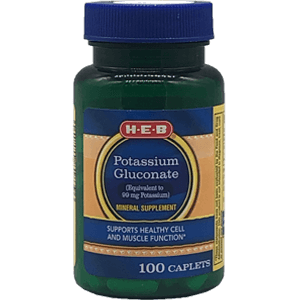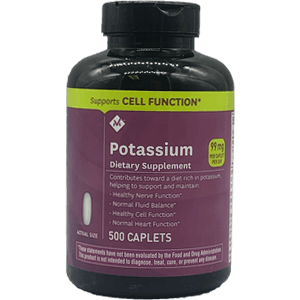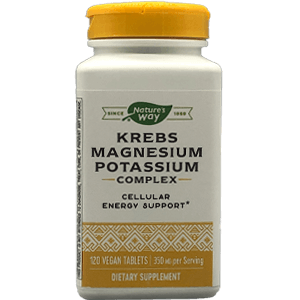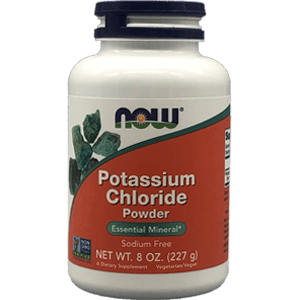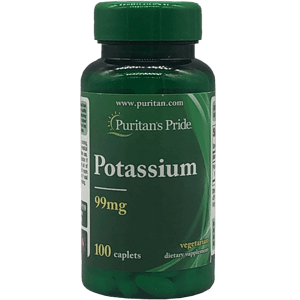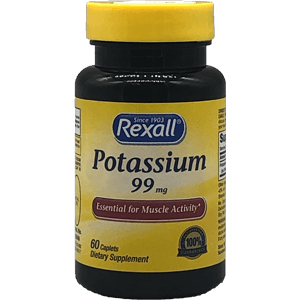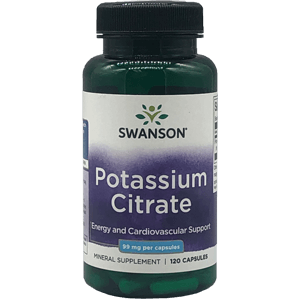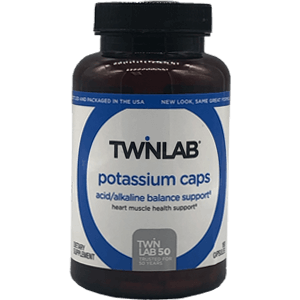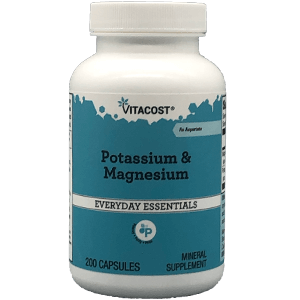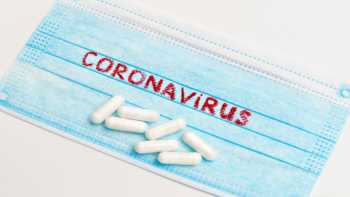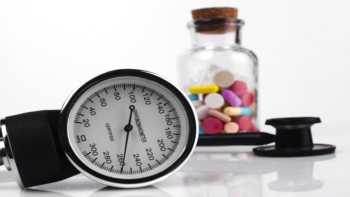Summary
-
What does potassium do?
Potassium is a mineral and electrolyte that is essential for the proper functioning of the nervous system, skeletal system, heart, and metabolism, as well as maintaining normal blood pressure (see What It Is). Symptoms of potassium deficiency can include muscle weakness, irregular heartbeat, listlessness, mood changes, irrational behavior, nausea, and vomiting.
-
Do I need to take a potassium supplement?
Potassium supplements are typically used only to treat or prevent potassium deficiency. Sufficient amounts of potassium can easily be obtained through the diet, but people taking certain drugs or with conditions affecting the kidneys or gut may be deficient (see What to Consider When Using). Low potassium is also common among people hospitalized with COVID-19. Supplementing with potassium may also help to reduce high blood pressure. The citrate form of potassium may also reduce the risk of kidney stones (see What It Does).
-
How much potassium should I take?
For preventing potassium loss, potassium is often recommended at doses of 200 to 400 mg, taken 3 to 4 times daily (for a total daily dose ranging from 600 mg to 1,600 mg). For lowering blood pressure in people with hypertension, larger amounts are often used (3,000 mg per day) (see What to Consider When Using). Nearly all common forms of potassium are absorbed equally well (see What to Consider When Buying).

Best potassium supplement?
As discussed in What CL Found, problems were found with potassium supplements. One could cause you to take 2.5 times as much potassium as you might expect from its label. Pills of the other product would not fully break apart within the allotted time, suggesting the ingredients might be less available for absorption. None of the products exceeded limits for contamination with heavy metals (lead, cadmium, and arsenic), unlike our findings in 2016 when we discovered a significant amount of arsenic in a potassium supplement.
Among the products that passed testing, ConsumerLab.com chose three Top Picks.-
Safety and side effects of potassium supplements:
Potassium from supplements may cause diarrhea, nausea, stomach pain, mild gas and vomiting, which may be reduced by taking with meals. Less common side effects include confusion, irregular heartbeat and shortness of breath. People with kidney disease and people taking potassium-sparing diuretics, ACE inhibitors, or trimethoprim/sulfamethoxazole should not take potassium supplements without medical supervision(see Concerns and Cautions).
+— 33 sources
In addition the results of its expert testing, ConsumerLab uses only high-quality, evidence based, information sources. These sources include peer-reviewed studies and information from agencies such as the FDA and USDA, and the National Academy of Medicine. On evolving topics, studies from pre-print journals may be sourced. All of our content is reviewed by medical doctors and doctoral-level experts in pharmacology, toxicology, and chemistry. We continually update and medically review our information to keep our content trustworthy, accurate, and reliable. The following sources are referenced in this article:
- Sun, J Am Coll Nutr 2020
- NIH Fact Sheet 2020
- Allen, Am Fam Physician 2012
- Rauf, Pharm Pharmacol Int J 2016
- Soygur, J Endourol 2002
- Ettinger, J Urol 1997
- Heller, J Urol 1998
- Barbera, Arch Ital Urol Androl 2016
- Nuki, Ann Rheum Dis 1975
- Toktam, medRxiv 2022 — preprint
- Chen, preprint in medRxiv 2020
- Alfano, preprint in medRxiv 2020
- National Academies 2019
- Dickinson, Cochrane Database Syst Rev 2006
- Filippini, J Am Heart Assoc 2020
- McEvoy, Eur Heart J 2024
- listing of potassium levels in foods
- Huang, JASN 2007
- Whang, Arch Intern Med 1992
- Tuttle, J Emerg Med 2022
- Raquel, Hypertension 2020
- Yuan, Nat Med 2023
- Neal, N Engl J Med 2021
- Ding, JAMA Cardiol 2025
- Xu, Hypertension 2024
- Yin, JMIR Public Health Surveill 2021
- Code of Federal Regulations, 8/12/2024
- Federal Register, 4/10/2023
- Narasaki, J Renal Nutr 2020
- Dockery, Mil Med 2022
- Chocano-Bedoya, Am J Epidem 2013
- Abe, Case Rep Neurol Med 2012
- FDA, 21CFR201.306
As a ConsumerLab.com member, you may print a copy of this report for your personal use.
You can access a special print version by clicking the "Print" icon in the upper right corner of this report.
You can then use your web browser's print functions to print the whole report or just selected pages.
You may also email or post a link to this report using the web address above.
Non-members using the link will see a free summary and can join to view the full report.
Other means of copying or distributing this report, in part or full, are not permitted.
If you are sight-impaired and your computer is having trouble converting the text in this report to speech,
contact us for assistance at Membership@ConsumerLab.com or by
phone at 914-722-9149.

